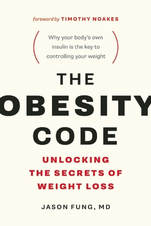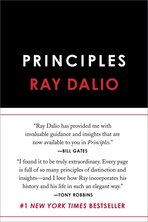 I heard about the book The Obesity Code: Unlocking the Secrets of Weight Loss by Dr. Jason Fung from my wife, who heard about it from her doctor friends. She insisted I read it, and I did it almost as a favor to her (I wasn't as interested in the subject matter). She wanted to talk about the content with me, and I thought I'd quickly get through it, and that would be that. I didn't even open up a Google doc to take notes on it because I initially didn't care. But about halfway through chapter 1, realized I couldn't not take notes. I was learning so much and enjoying the book so much that I had to take notes. I had gotten some sense for the book's conclusions from other things I've read (like Tim Ferriss's books and podcast that have discussed the same solutions like intermittent fasting, slow carb, etc.), so it wasn't like the subject was brand new to me. It's just that it was explained so clearly and hooked me so well with its writing that I ended up learning a lot more than I expected. And most importantly, I'm actually making changes based on what I learned. Thankfully I'm not overweight, but I still want to eat healthy and avoid doing things that can harm my health in the long run. That's actually a question I was hoping the author would answer but didn't in this book: which of the lessons/guidelines should be adopted by non-overweight people just as a matter of healthy living? The book was written by a doctor and is evidence-based, citing only legitimate human studies (no animal studies). It debunks a lot of the commonly held beliefs around dieting and normal nutrition advice (like from the American Heart Association or the government's food pyramid). I love how the book starts off with a poignant question: Why are there fat doctors? Maybe because even many doctors have been fooled into believing the wrong thing (that gaining weight is about temptation control and the right diet as opposed to the truth: it's really about hormones, and eating more naturally and less frequently can solve a lot of problems people have). My biggest takeaways: Problem: Insulin Solutions: Intermittent fasting 3 meals per day, no snacks Removing fructose and artificial sweeteners Stress management and sleep to lower cortisol Stop sugary drinks, juices, snacking Eat fiber if eating carbs Full notes below.
4 Comments
 I finally finished making my way through Principles: Life and Work by Ray Dalio. I had heard so many good things about the book and had really enjoyed listening to some of the podcasts and speeches the author has given. The book was very well organized and presents a very interesting approach for running an organization. While I did learn a lot and have a lot of new things to think about now, I didn't think the book was as life-changing or revolutionary as some of the hype makes it out to be. The organization, Bridgewater, does sound unique, and I'd love to experience firsthand how believability-weighted decision making happens in real-time using all the tools he described. I want to feel what the idea-meritocratic culture is like and if it is in fact so different from other places and how embodied all these principles really are. My first biggest takeaway overall from the book is the idea that one should consider what principles one is operating under in general and write them down. I had done some of the former but not the latter, and after reading this book, I started my own list of written principles. My second biggest takeaway is how to maintain a balance between open-mindedness and assertiveness while arguing about a decision. Other cool things I took away were the concepts of believability (formalizing and quantifying how trustworthy someone is), which psychological/personality tests they believe in, and the collection of tools they use to make their principles actionable on a daily basis. As I was reading this book, I did catch myself wondering whether so much thinking of one's organization as a machine and doing everything idea-meritocratically and believability-weighted hampers any of the human elements of working on a company together. It felt like this approach could err dangerously close to thinking of one's team members as robots or automatons, just action figures with baseball cards and stats on where you can trust/believe them, and a machine to make them do what you need -- as opposed to three-dimensional, creative, wistful, soulful, erratic, emotional, complex people that are working together, with foibles and all, to try to achieve something. I don't know if the two views are diametrically opposed, but this book's approach felt to me to be a lot more mechanical and rigid (principled, obviously) in its treatment of people, and I wonder what any drawbacks (or unintended second order consequences) of that might be. The author explicitly wrote about the value of relationships, so I know this element is important for him, and I know he believes that radical transparency, honesty, and tough love is in the end the best for relationships. I just wonder how well it really treats people and makes them feel in practice. My full notes are below. |
Archives
June 2024
Categories
All
Subscribe |
 RSS Feed
RSS Feed
